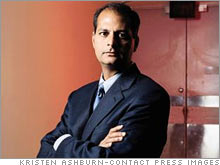|
Can this man make MySpace safe for kids? Being seen as unsafe may be an even bigger risk than being uncool.
(FORTUNE Magazine) -- Perhaps MySpace - the social-networking site that is home to more than 80 million users - has always been a lawsuit waiting to happen. But when a 14-year-old Texas girl and her mother filed a $30 million suit against the site and its owner, News Corp., (Charts) on June 19 for failing to protect the site's youngest users, the risks of MySpace's open-access policies became apparent. The girl says that a 19-year-old posing on the site as a high school football player lured her in May to an apartment-complex parking lot, where he sexually assaulted her. A year has passed since Rupert Murdoch bought MySpace for some $580 million, and just like the young crowd it caters to, the site is growing up fast but still learning to navigate the darker elements of society. Until recently its biggest worry was how to avoid becoming yesterday's fad. Yet with every new report of sexual predators lurking on the site, MySpace could find that the only thing worse than seeming uncool is being deemed unsafe.
To secure its borders, on May 1 MySpace hired a lawman: 41-year-old father of four Hemanshu Nigam, whose entire career seems to have led to this point. Born in Kanpur, India, Nigam moved to Connecticut at age 3 and later studied law at Boston University. He began his career in Los Angeles County as a prosecutor who busted gangs and sexual predators. Then he worked as a federal prosecutor in Washington, D.C., specializing in child-pornography, child-predator, and child-trafficking cases. "I prosecuted over 100 child-molester and Internet-predator cases," he says. "The things I have seen you don't really want to write about." Nigam took a break of sorts to spearhead antipiracy strategy for the Motion Picture Association of America, but in 2002 he joined Microsoft (Charts) as head of its child-safety security team. When MySpace came calling, Nigam's friend Ernie Allen, president of the National Center for Missing and Exploited Children, encouraged him to take the job. "We're one of the first sites to face the challenges most people will face in a social-networking environment," Nigam says. "This is a leadership opportunity." Safety measures Nigam is taking some obvious steps, like beefing up the staff that monitors the site. But he is also reaching out to groups like the National PTA to educate parents - many of whom are baffled by the site - on how to teach their kids Internet safety. MySpace has for some time had basic safety policies in place to protect children: No one under the age of 14 can have a profile on the site. And those aged 14 and 15 have their pages automatically set as private - viewable only by friends they designate. Another safeguard was announced in June, when MySpace began requiring that users over 18 must know the full name or e-mail of a 14- or 15-year-old before contacting them. The trouble is, a user's age on MySpace is self-reported, so if someone younger wants to portray himself as older - or vice versa - it's tough for the site to stop him. As Nigam points out, "If you're under the age of 18, there's almost no data on you that's publicly available." The magic bullet for MySpace would be the ability to verify a user's identity and age with absolute certainty, but even if that were possible (think: invasive biometrics), there would still be no telling someone's motives. It's a puzzle for Nigam and a critical test for a gawky site in transition. There's a reason, after all, why the kids keep going back to MySpace. It's where a person can be anyone he wants to be. ______________________________ Related: |
|

